Running a field service business means juggling schedules, dispatching technicians, tracking job progress, and managing invoices. While QuickBooks is the gold standard for accounting, it wasn't built to handle the operational chaos of a mobile workforce. The constant double-entry, chasing down technicians for timesheets, and reconciling paper work orders with invoices creates administrative bottlenecks that cost you time and money. This is where dedicated field service management software for QuickBooks becomes a game-changer, transforming your accounting hub into a complete business command center.
By connecting your field operations directly to your books, you eliminate data silos, automate invoicing, and gain a real-time view of your business's financial health. Some solutions even offer robust project management capabilities for more complex, multi-stage jobs. This guide cuts through the marketing noise to deliver a detailed analysis of the top FSM platforms that integrate seamlessly with both QuickBooks Online and Desktop.
We dive deep into the 12 best options for your trade business, exploring practical use cases, honest limitations, and specific integration nuances. Each review includes screenshots and direct links, providing everything you need to find the perfect operational partner for your accounting software.
1. Intuit Field Service Management (powered by Corrigo)
As Intuit's official offering, Intuit Field Service Management (IFSM) provides the most direct integration path for many businesses, particularly those heavily invested in the QuickBooks Desktop ecosystem. Powered by Corrigo, this platform is designed to eliminate the operational friction between your field technicians and back-office accounting staff. It excels at creating a closed-loop system where work orders generated in IFSM are seamlessly converted into QuickBooks invoices without redundant data entry.
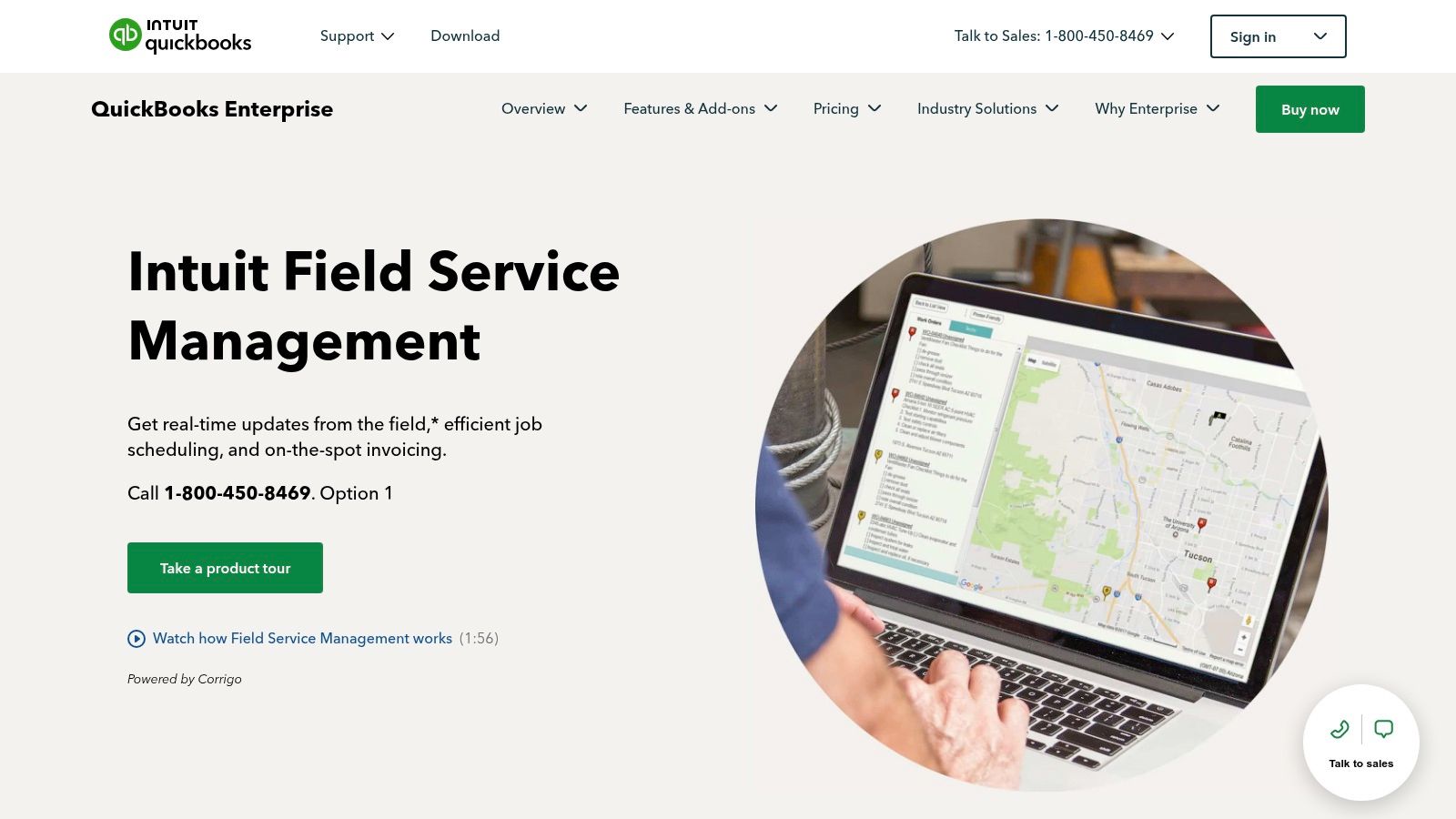
The primary advantage is its native, two-way sync with QuickBooks, especially QuickBooks Desktop Enterprise. This tight connection ensures that customer information, invoices, and payment statuses are consistently up-to-date across both platforms. However, its user interface can feel dated compared to more modern, cloud-native solutions, and its deepest integration benefits are historically tied to the Desktop versions of QuickBooks. Pricing is not transparent and requires contacting sales, which can be a hurdle for smaller businesses wanting quick cost assessments.
Best For: Companies using QuickBooks Desktop Enterprise that prioritize a direct, Intuit-supported integration over a modern user interface.
Key Features:
- Deep QuickBooks Sync: Native two-way synchronization with QuickBooks Desktop and Online.
- Real-Time Dispatch Board: Visual scheduling and dispatching to manage technician assignments.
- Mobile App: Empowers technicians to receive work orders, update job status, and create invoices from the field.
- Equipment Service History: Tracks asset history for better maintenance and customer service.
Website: https://quickbooks.intuit.com/desktop/enterprise/field-service-management/
2. ServiceTitan
ServiceTitan is a premium, all-in-one platform built for large-scale home and commercial service businesses, especially in the HVAC, plumbing, and electrical trades. It goes beyond basic dispatching to offer a complete business management solution. Its integration with QuickBooks is designed for high-volume operations, allowing for real-time transaction exports that keep financial data accurate without manual intervention. This makes it a powerful piece of field service management software for QuickBooks users managing complex job costing and inventory.
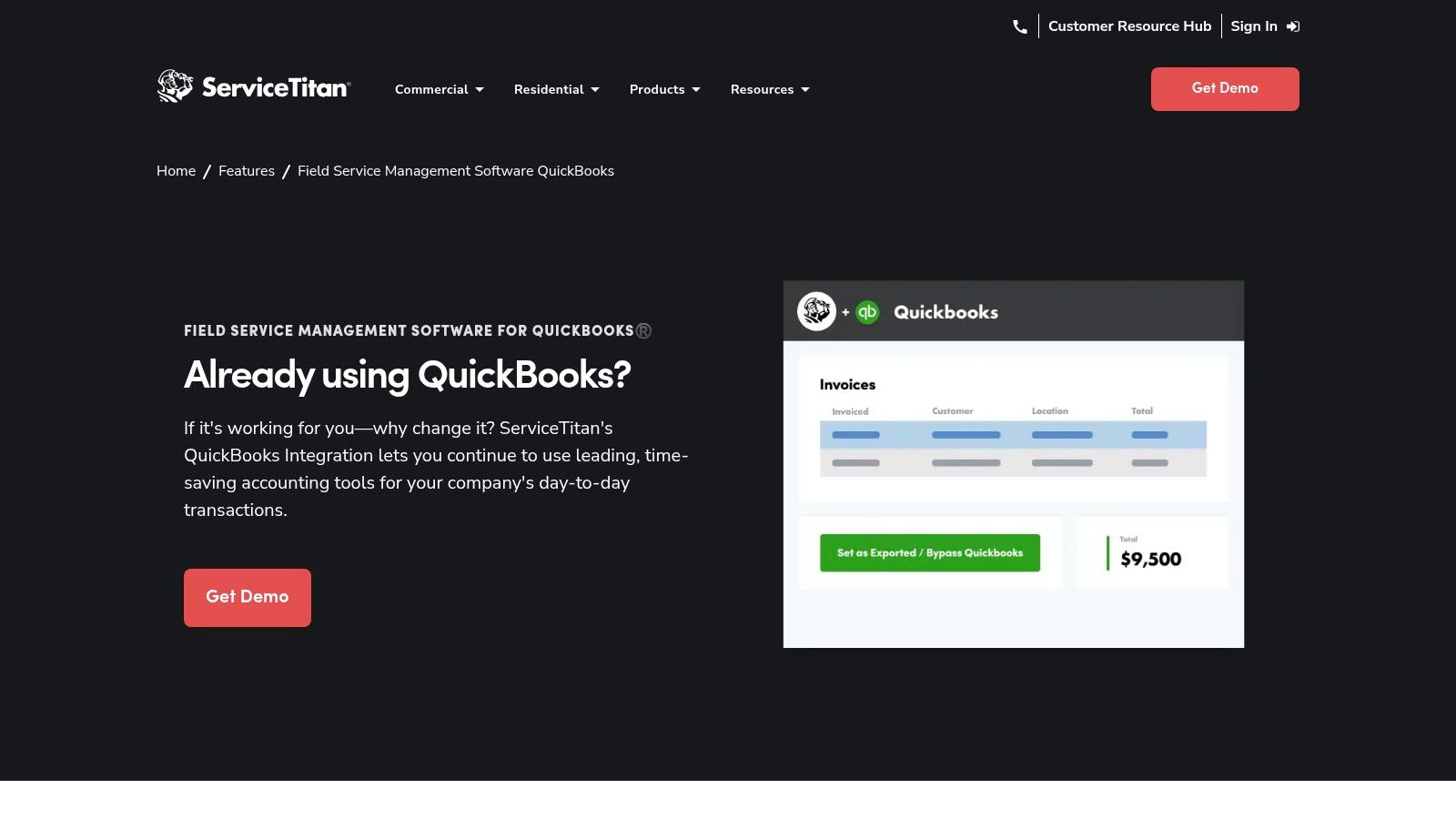
The platform's main advantage is its comprehensive feature set, covering marketing, sales, and operations alongside field service. However, this depth comes at a significant cost, with pricing that puts it out of reach for smaller companies or sole proprietors. The integration with QuickBooks Desktop is often considered more robust than its QuickBooks Online counterpart, which is a key consideration for businesses choosing their accounting backbone. Access to pricing and a full demo requires a sales consultation.
Best For: Larger, established service businesses in trades like HVAC or plumbing that need an enterprise-grade system and can justify the premium price tag.
Key Features:
- Robust Accounting Integrations: Exports invoices, payments, and purchase orders directly to QuickBooks Desktop and Online.
- Job Costing & Pricebook Management: Advanced tools to track profitability and manage complex service pricing.
- Paperless Invoicing: Technicians can generate and process invoices and purchase orders directly from the mobile app.
- Strong Mobile Experience: A feature-rich mobile app that empowers technicians with customer history, sales tools, and more.
Website: https://www.servicetitan.com/features/field-service-management-software-quickbooks
3. Housecall Pro
Housecall Pro has carved out a significant niche by focusing on small to mid-sized home service businesses, offering a modern, mobile-first approach to field service management. Its integration with QuickBooks is a core strength, designed to be intuitive and fast to implement. The platform streamlines the entire workflow, from scheduling and dispatching to invoicing and payment processing, syncing key data like customers, line items, and invoices directly with both QuickBooks Online and QuickBooks Desktop.
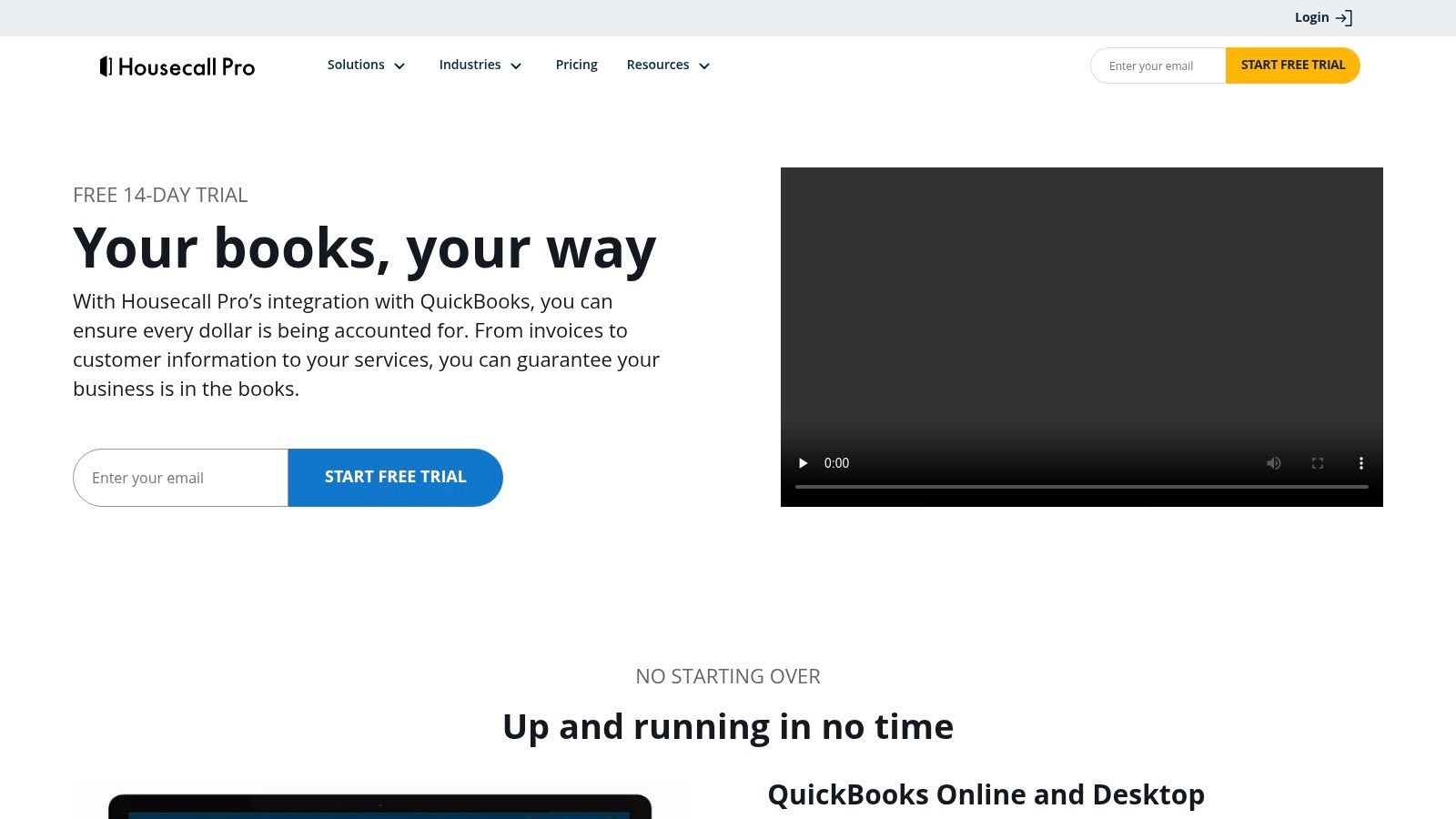
What sets Housecall Pro apart is its emphasis on user experience and business growth tools, all within transparent pricing tiers. Unlike more complex enterprise systems, it's built for rapid adoption by technicians and office staff alike. While it may lack the deep customization of larger platforms, its combination of core FSM features and built-in marketing tools provides exceptional value. The primary drawback is that costs can escalate as you add more users or premium features.
Best For: Residential service businesses (plumbing, HVAC, electrical) seeking an easy-to-use, mobile-friendly platform with straightforward QuickBooks integration.
Key Features:
- Dual QuickBooks Sync: Supports two-way synchronization with both QuickBooks Online and Desktop versions.
- Strong Mobile App: Provides technicians with a robust mobile experience for job management and payments.
- Visual Price Book: Allows for creating and presenting professional, itemized estimates in the field.
- Integrated Marketing Tools: Includes features for email marketing, postcard campaigns, and online review management.
Website: https://www.housecallpro.com/features/quickbooks/
4. Jobber
Jobber is a highly popular field service management software designed specifically for small to medium-sized home service businesses. It stands out with its user-friendly interface, transparent pricing, and a strong focus on core operational workflows like quoting, scheduling, and invoicing. The platform’s integration with QuickBooks Online is a key selling point, designed to automate the flow of financial data from the field directly into your accounting system, reducing administrative overhead and manual entry errors.
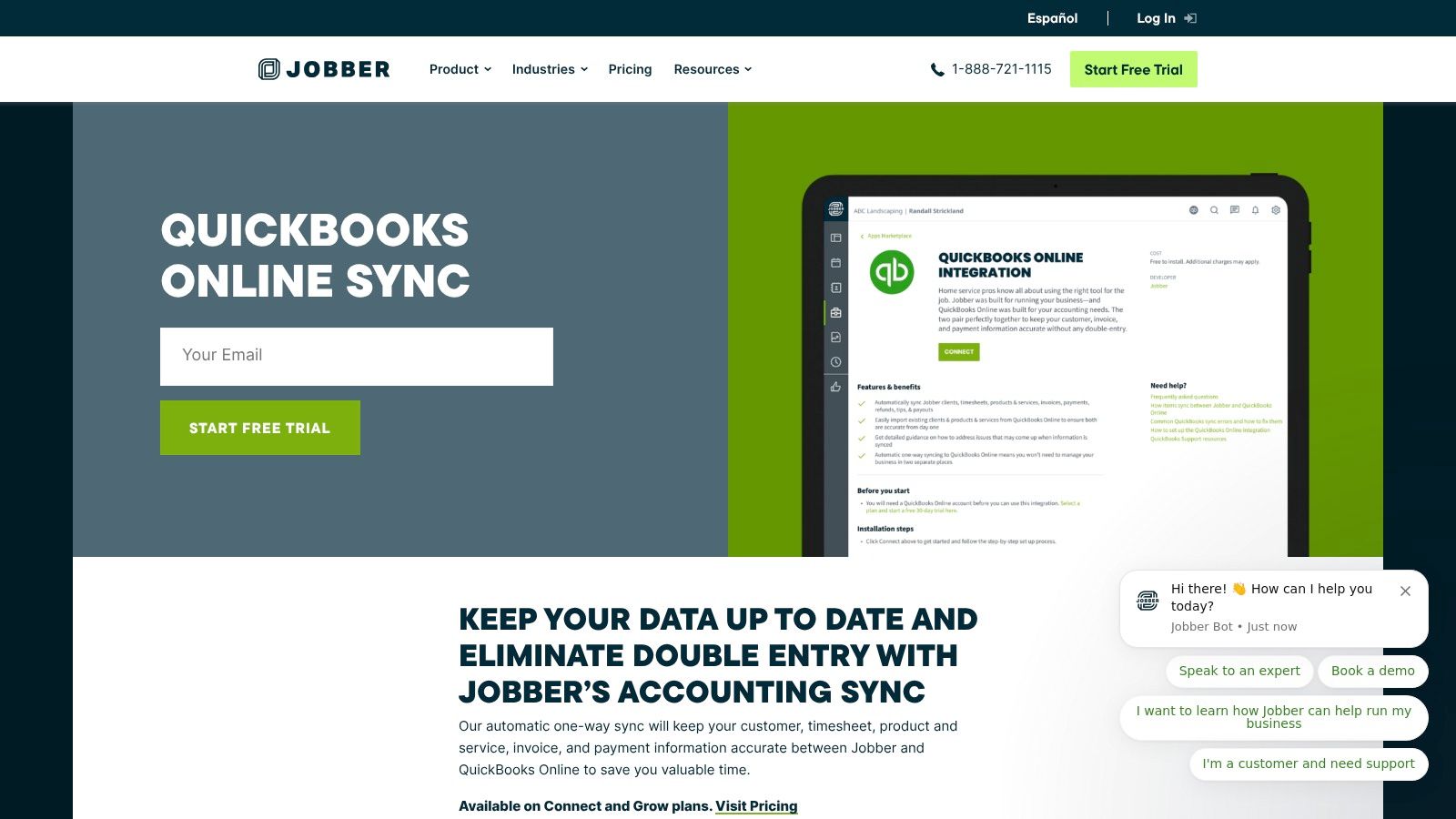
The platform's main advantage is its simplicity and ease of onboarding, making it an excellent choice for businesses transitioning from paper-based systems. However, its QuickBooks integration is exclusively for QuickBooks Online (QBO) and operates on a one-way sync basis. This means data like clients, invoices, and payments push from Jobber to QBO. Any changes must be initiated within Jobber to maintain data integrity, which can be a procedural adjustment for teams used to working in both apps. It does not support QuickBooks Desktop.
Best For: Small to medium-sized service businesses using QuickBooks Online who value a modern interface, transparent pricing, and easy-to-use core features.
Key Features:
- Automated QuickBooks Online Sync: Pushes clients, products, services, invoices, and payments from Jobber to QBO.
- Robust Quoting and Scheduling: Easily create and send professional quotes, then convert them into jobs on a drag-and-drop calendar.
- Client Hub: A self-service online portal where customers can view appointment details, approve quotes, and make payments.
- Automated Invoice Reminders: Set up automatic follow-ups to get paid faster without manual chasing.
Website: https://www.getjobber.com/features/quickbooks-sync/
5. FieldEdge
FieldEdge is a robust field service management software built specifically for trade-based businesses like HVAC, plumbing, and electrical. It stands out with a long history and deep, mature workflows that cater directly to the complex needs of these industries. The platform’s core strength is its powerful two-way synchronization with both QuickBooks Desktop and Online, which streamlines the flow of financial data from field operations to accounting. This integration is designed to manage everything from customer information to final payment processing, reducing manual data entry.
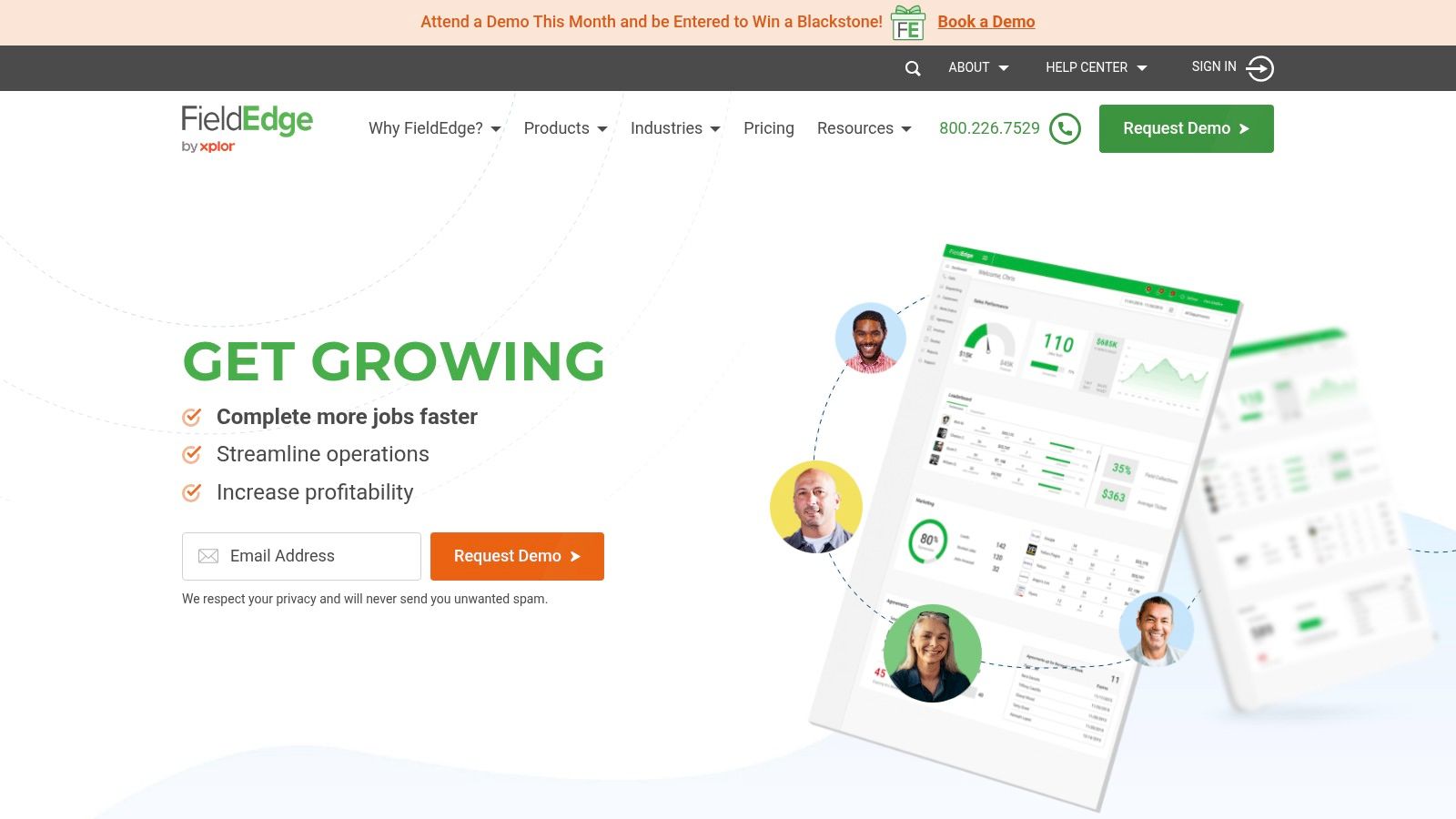
While the QuickBooks integration is a major draw, it’s important to note its nuances; for instance, new customers created in QuickBooks Desktop do not automatically sync back to FieldEdge. The software's pricing is not publicly listed and requires a custom quote, which may also include significant onboarding and setup fees. This structure makes FieldEdge a better fit for established contractors who need detailed, industry-specific features and are prepared for a more involved implementation process, rather than smaller shops needing a simple, low-cost solution.
Best For: Established HVAC, plumbing, and electrical contractors who need specialized, in-depth workflows and a mature QuickBooks Desktop integration.
Key Features:
- Two-Way QuickBooks Sync: Manages customers, items, invoices, and payments between FieldEdge and QuickBooks.
- Live Dispatch Board: Provides real-time visibility into technician location and job status for efficient dispatching.
- Service Agreements: Automates recurring maintenance schedules, billing, and customer notifications.
- Advanced Inventory Management: Tracks parts from warehouse to truck to job site, improving accuracy.
Website: https://www.fieldedge.com/
6. Smart Service (including Smart Service 365)
Smart Service positions itself as a direct companion to QuickBooks, offering a choice between a traditional on-premise solution for QuickBooks Desktop and a modern cloud-based version, Smart Service 365, for QuickBooks Online. This dual offering makes it a flexible piece of field service management software for QuickBooks users, regardless of which accounting platform they prefer. Its core strength lies in its purpose-built design to extend QuickBooks' functionality into the field with robust scheduling, dispatching, and mobile work order management.
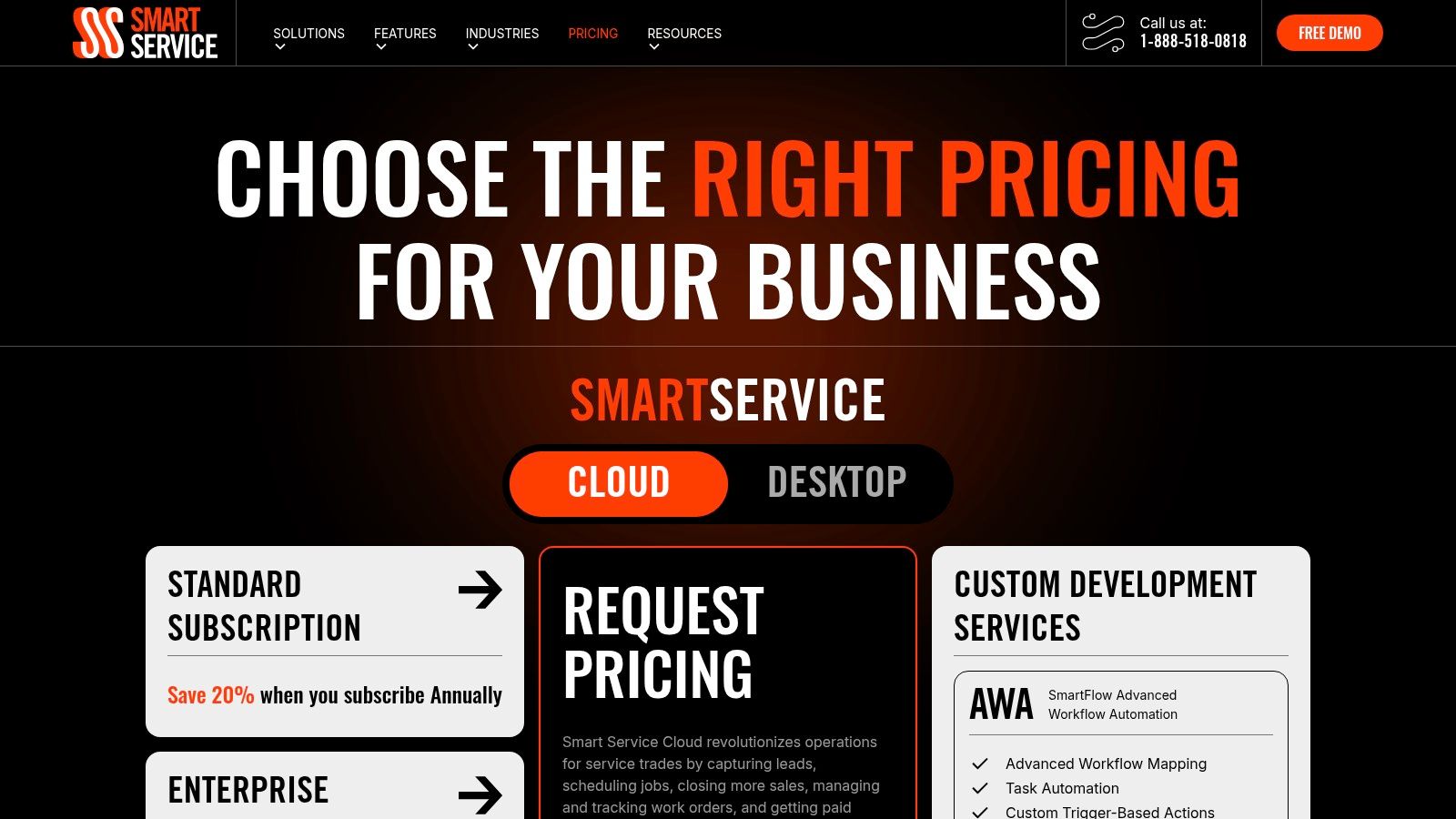
The platform is particularly known for its drag-and-drop scheduler and industry-specific templates, which help streamline setup for trades like HVAC, plumbing, and electrical. While the cloud version (Smart Service 365) has transparent per-user pricing, the cost for the legacy desktop edition requires a sales consultation. This per-user model can become expensive for companies with a large number of technicians, making it crucial to evaluate the total cost of ownership before committing.
Best For: Service businesses that want a dedicated QuickBooks add-on and value the choice between a cloud or on-premise desktop solution.
Key Features:
- Direct QuickBooks Integration: Connects seamlessly with both QuickBooks Desktop and Online editions.
- Drag-and-Drop Scheduler: Simplifies job assignments and provides a clear visual of your team's daily schedule.
- Mobile App for Field Service: Allows technicians to manage jobs, track time, and process payments on-site.
- Customizable Forms and Time Tracking: Create digital forms and track employee hours directly within the system.
Website: https://www.smartservice.com/pricing
7. Service Fusion
Service Fusion is a powerful contender for small to mid-sized businesses seeking an all-in-one field service management software for QuickBooks without per-user pricing. Its key differentiator is the flat-rate monthly fee that includes unlimited office and admin users, making it exceptionally scalable for growing teams. This model provides predictable costs, allowing companies to expand their back-office staff without incurring additional software license fees. The platform offers a native, one-way push integration to both QuickBooks Desktop and QuickBooks Online, simplifying the transfer of customer, invoice, and payment data.
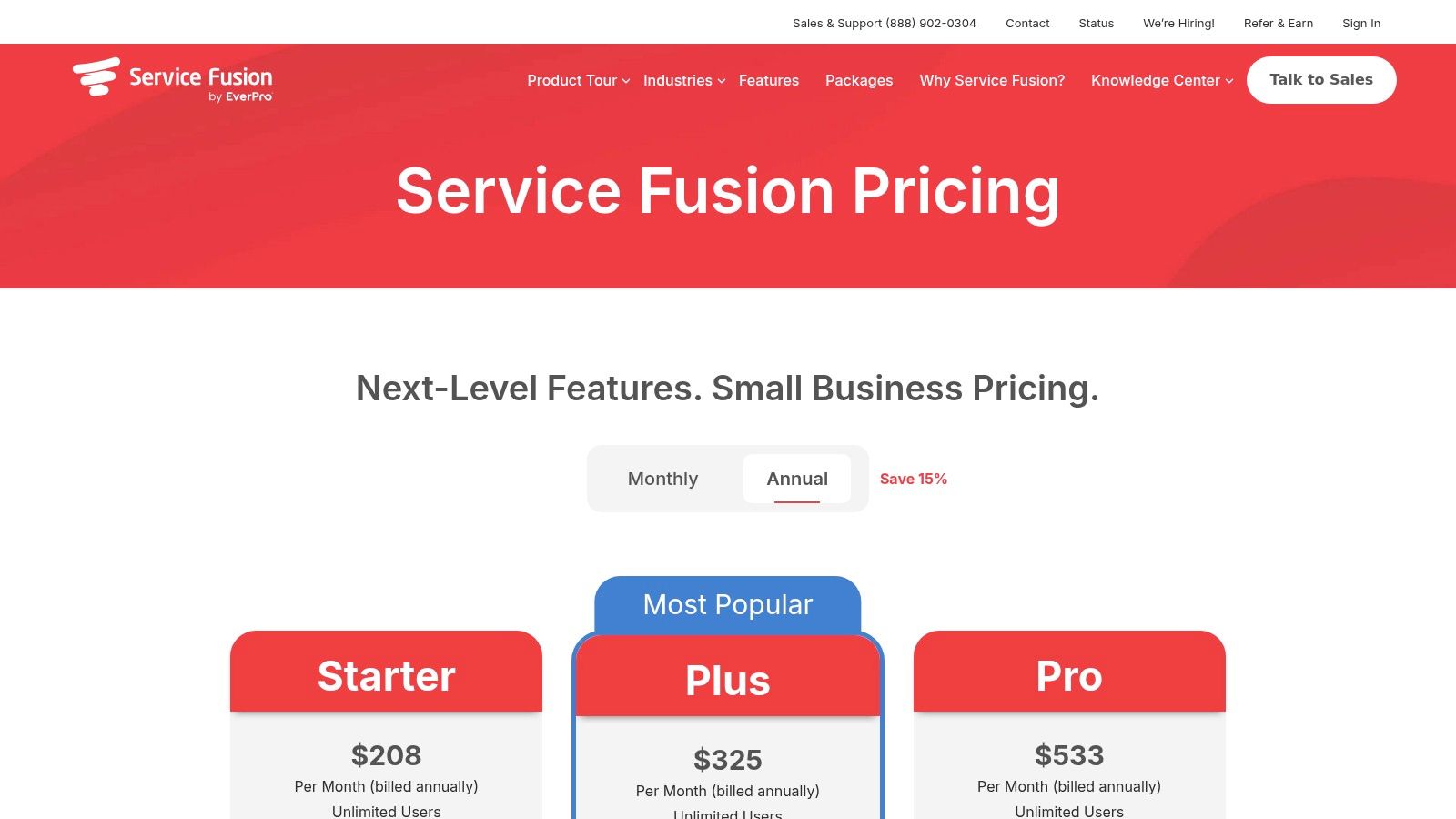
The platform is built on a tiered pricing structure, which allows businesses to start with essential features and add more advanced capabilities like job costing, inventory management, or integrated voice tools as they grow. While this offers flexibility, it means some critical functions are locked behind higher-priced plans or require add-on fees. The user interface is clean and generally intuitive, but new users often benefit from a guided demo to understand the full workflow and properly configure the QuickBooks integration for their specific needs.
Best For: Growing SMBs that need a predictable, flat-rate pricing model to support an expanding back-office team.
Key Features:
- QuickBooks Integration: Native sync with both QuickBooks Desktop and Online to push customer and invoice data.
- Unlimited Users: All plans include unlimited admin and office user seats.
- Integrated Payments: Process credit card and ACH payments directly within the platform.
- Optional Voice & Call Center Tools: Add-on features to track calls and improve customer communication.
- Job Costing & Inventory: Available in higher-tier plans for detailed financial tracking.
Website: https://www.servicefusion.com/pricing
8. Workiz
Workiz is a modern field service management platform specifically designed for on-demand home service businesses like locksmiths, plumbers, and appliance repair professionals. It stands out with a clean, user-friendly interface and a strong focus on simplifying job management from lead to payment. Its integration with QuickBooks Online is a core feature, allowing businesses to sync invoices, customers, and payments to keep financial records accurate without manual data entry.
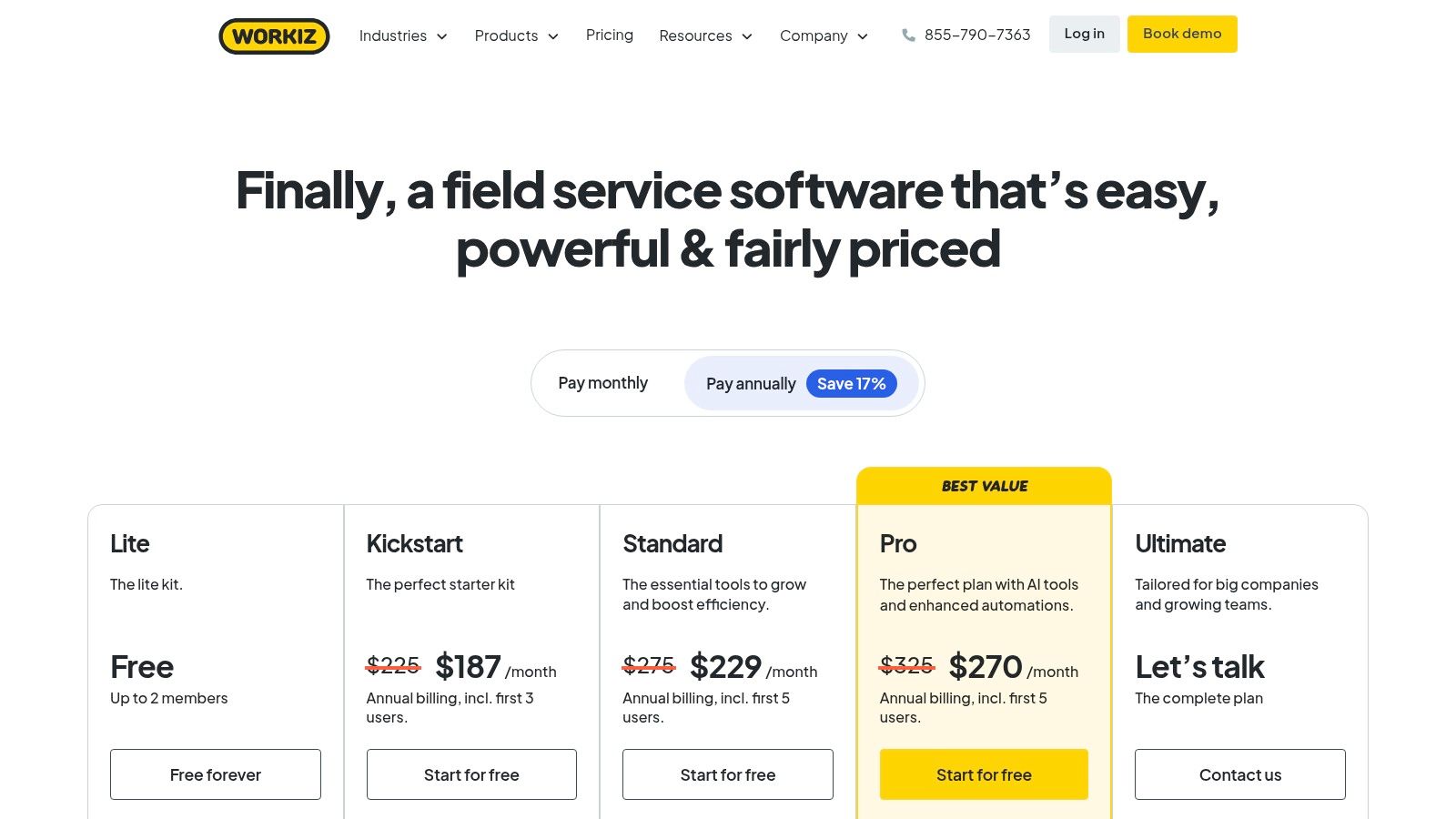
The platform’s major draw is its accessibility, offering a free "Lite" plan for up to two users, which is perfect for solo operators or very small teams starting out. The tiered pricing is transparent, making it easy to scale as your team grows. However, a key consideration for established businesses is that Workiz no longer offers QuickBooks Desktop integration for new customers, focusing entirely on QuickBooks Online. Advanced features like automation and call tracking are often locked behind the higher-priced plans.
Best For: Small to mid-sized home service businesses using QuickBooks Online who value a modern interface and a free starting point.
Key Features:
- QuickBooks Online Sync: Syncs customers, items, invoices, and payments directly to QBO on paid plans.
- Online Booking & Payments: Allows customers to book services and pay invoices directly online.
- Job Management: Includes scheduling, dispatching, real-time tracking, and customer communication tools.
- Reporting & Dashboards: Provides insights into job profitability, technician performance, and business metrics.
Website: https://www.workiz.com/pricing-plans/
9. mHelpDesk
mHelpDesk is a robust and long-standing player in the market, offering a comprehensive suite of tools for scheduling, dispatching, estimating, and invoicing. Its key differentiator is its strong, dedicated support for both QuickBooks Desktop and QuickBooks Online. The platform facilitates a two-way sync, ensuring that customer data, estimates, invoices, and payments flow seamlessly between your field operations and accounting software, significantly reducing manual data entry and potential errors.
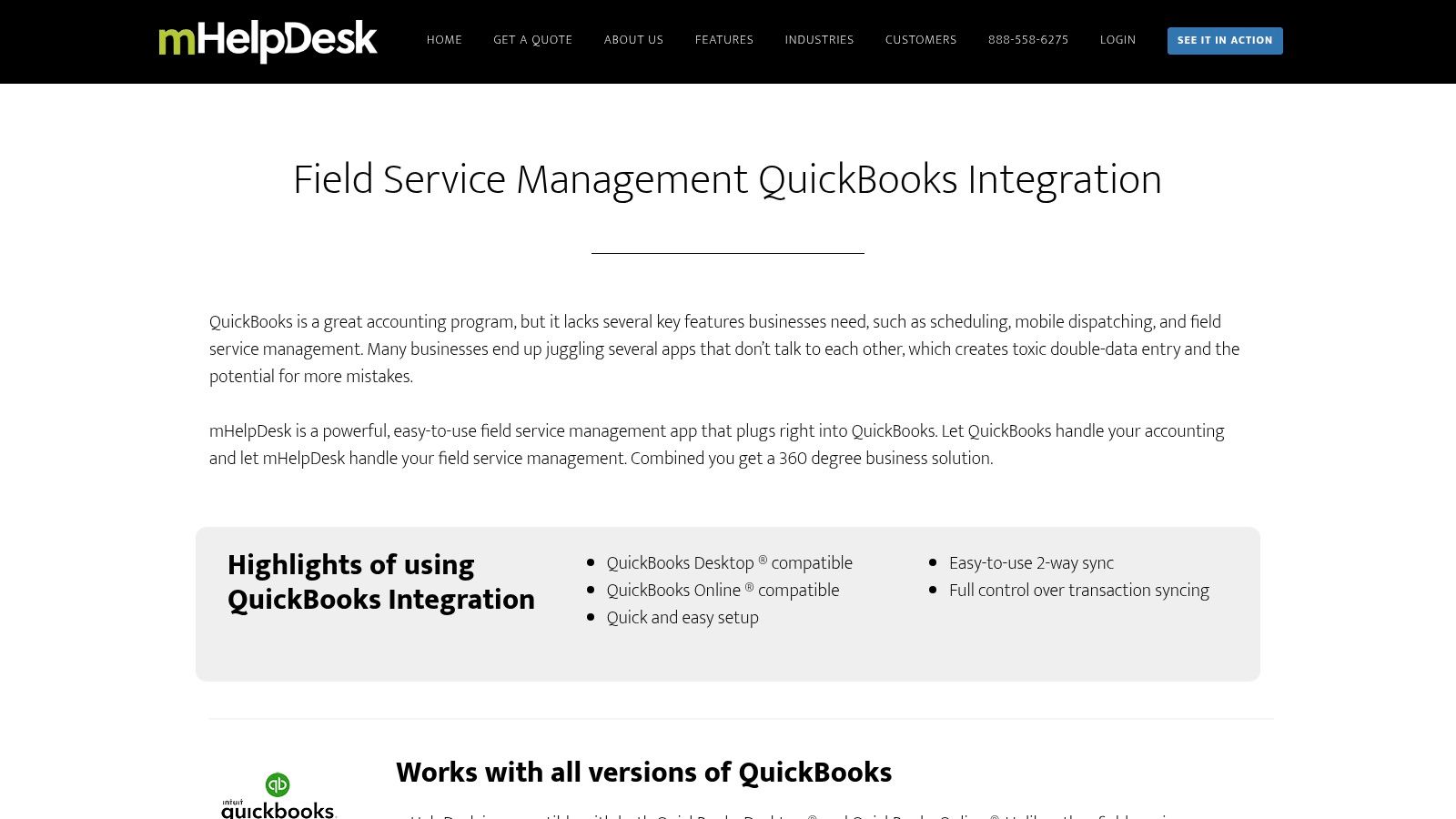
The platform is particularly useful for businesses that want to empower technicians to handle more of the sales and billing cycle in the field. However, the integration with QuickBooks Desktop requires a separate connector application, which adds a layer of technical complexity to the setup. While mHelpDesk provides detailed setup guides, some documentation can feel dated. Pricing is not publicly listed and requires a custom quote, which may be a barrier for smaller businesses needing immediate cost information.
Best For: Service businesses that utilize both QuickBooks Desktop and Online across different departments and need a unified workflow for estimating and invoicing.
Key Features:
- Dual QuickBooks Sync: Offers full two-way synchronization for both QuickBooks Desktop and Online versions.
- Mobile Estimating and Invoicing: Allows technicians to create, send, and manage estimates and invoices directly from the mobile app.
- Offline Functionality: The mobile app works offline, syncing data automatically once a connection is restored.
- Import/Export Utilities: Provides tools to easily import customer lists and other data to streamline setup.
Website: https://www.mhelpdesk.com/features/quickbooks-integration
10. RazorSync
RazorSync positions itself as an accessible and transparent choice for small to mid-sized service businesses seeking to streamline operations. Its major differentiator is its straightforward, publicly available pricing, which is a welcome change from the "contact us for a quote" model common in the industry. The platform is built around empowering field teams with robust mobile capabilities while providing office staff with essential scheduling and dispatching tools. It offers a clear path to integrating with both QuickBooks Online and Desktop, making it a flexible option for growing companies.

The primary appeal is its honesty in costing. The QuickBooks integration is an add-on, but its price is clearly stated, allowing businesses to accurately budget for this crucial piece of field service management software for QuickBooks. This transparency extends to its available 1-on-1 training. However, the fact that the sync is an extra monthly fee might deter businesses on a very tight budget. Additionally, while it supports QuickBooks Desktop, users may need to work with specific sync utilities, which can add a layer of complexity compared to cloud-native integrations.
Best For: Small and mid-sized businesses that value transparent pricing and want a solid mobile FSM solution with a clear, albeit extra, cost for QuickBooks integration.
Key Features:
- Clear Add-On Pricing: QuickBooks sync (Online and Desktop) is offered as an add-on with a disclosed monthly fee.
- Mobile-First Design: Strong mobile apps allow technicians to manage schedules, update jobs, and process payments.
- Scheduling and Dispatch: Visual tools for organizing and assigning jobs to field personnel.
- Route Optimization: Helps create the most efficient daily routes for technicians to save time and fuel.
Website: https://www.razorsync.com/pricing/
11. ServiceM8
ServiceM8 is a standout choice for small trade and service businesses, offering a powerful, mobile-first approach to field service management. Its unique value proposition lies in its affordable, job-based pricing model, which includes unlimited users on every plan. This structure is ideal for growing teams that need to add technicians or office staff without incurring per-user fees, making it one of the most scalable options for small operations using QuickBooks Online.
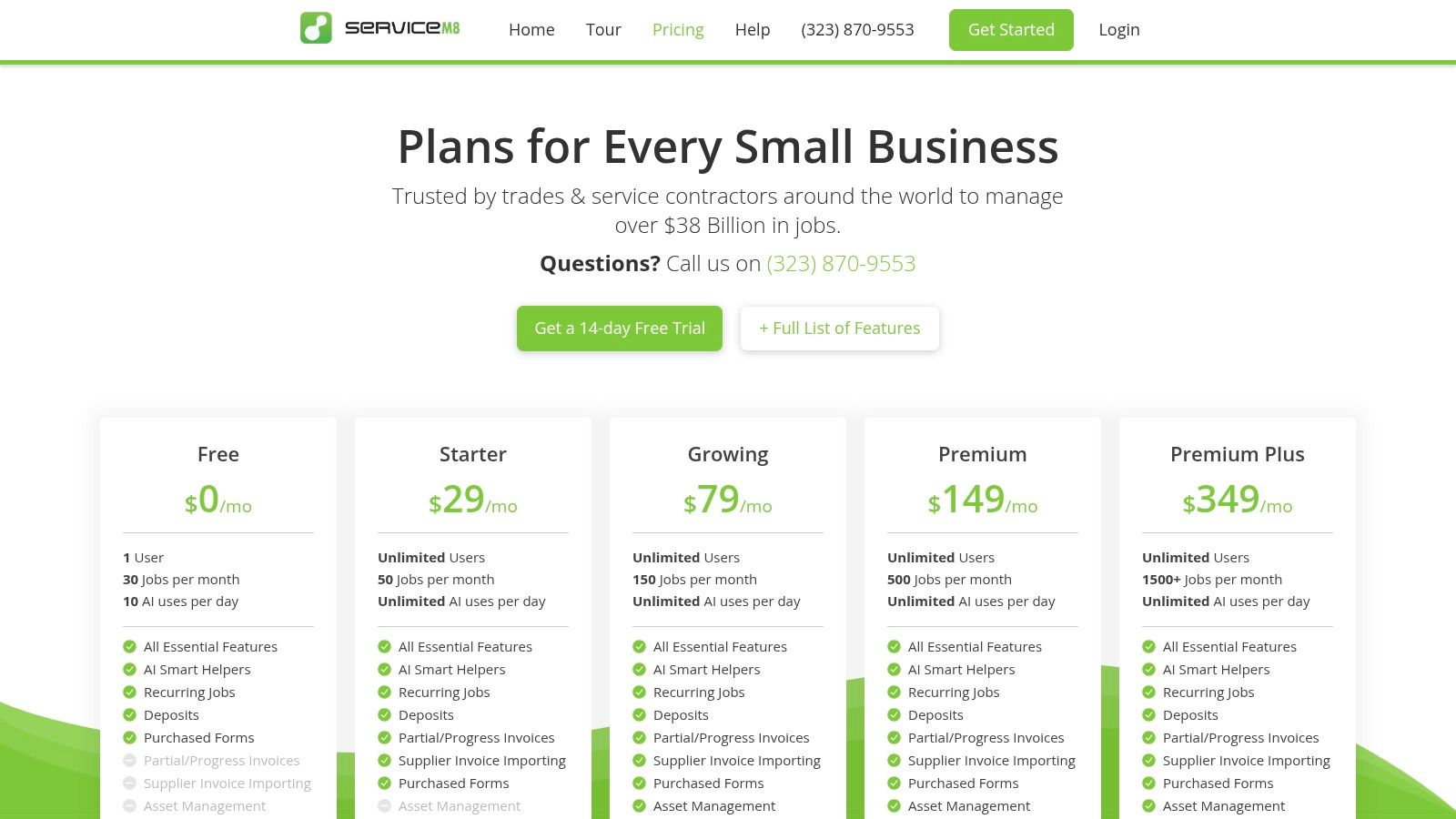
The platform is designed for rapid setup and boasts a highly-rated mobile app that keeps field and office teams perfectly in sync. However, its pricing is based on the number of jobs completed per month, which can lead to unexpected costs or the need to upgrade plans during busy seasons. A significant limitation for some is that ServiceM8 integrates exclusively with QuickBooks Online, offering no support for QuickBooks Desktop users.
Best For: Small to medium-sized service businesses using QuickBooks Online who prioritize a strong mobile experience and want to avoid per-user pricing.
Key Features:
- Job-Based Pricing: Includes unlimited users, with plans based on monthly job volume.
- QuickBooks Online Sync: Smooth integration for customers, items, invoices, and payments.
- Mobile-First Design: Robust app for scheduling, quoting, invoicing, and payment collection in the field.
- AI-Powered Features: Includes tools like "Ask AI" for business advice and automated form filling.
Website: https://www.servicem8.com/us/pricing
12. ServiceTrade
ServiceTrade carves out a niche by focusing specifically on the needs of commercial service contractors, offering a robust platform designed for complex, asset-centric work. Unlike residential-focused software, it provides commercial-grade workflows that excel in managing long-term customer relationships and equipment maintenance schedules. This focus makes it a powerful piece of field service management software for QuickBooks users in the commercial sector, where tracking asset history and compliance is paramount.
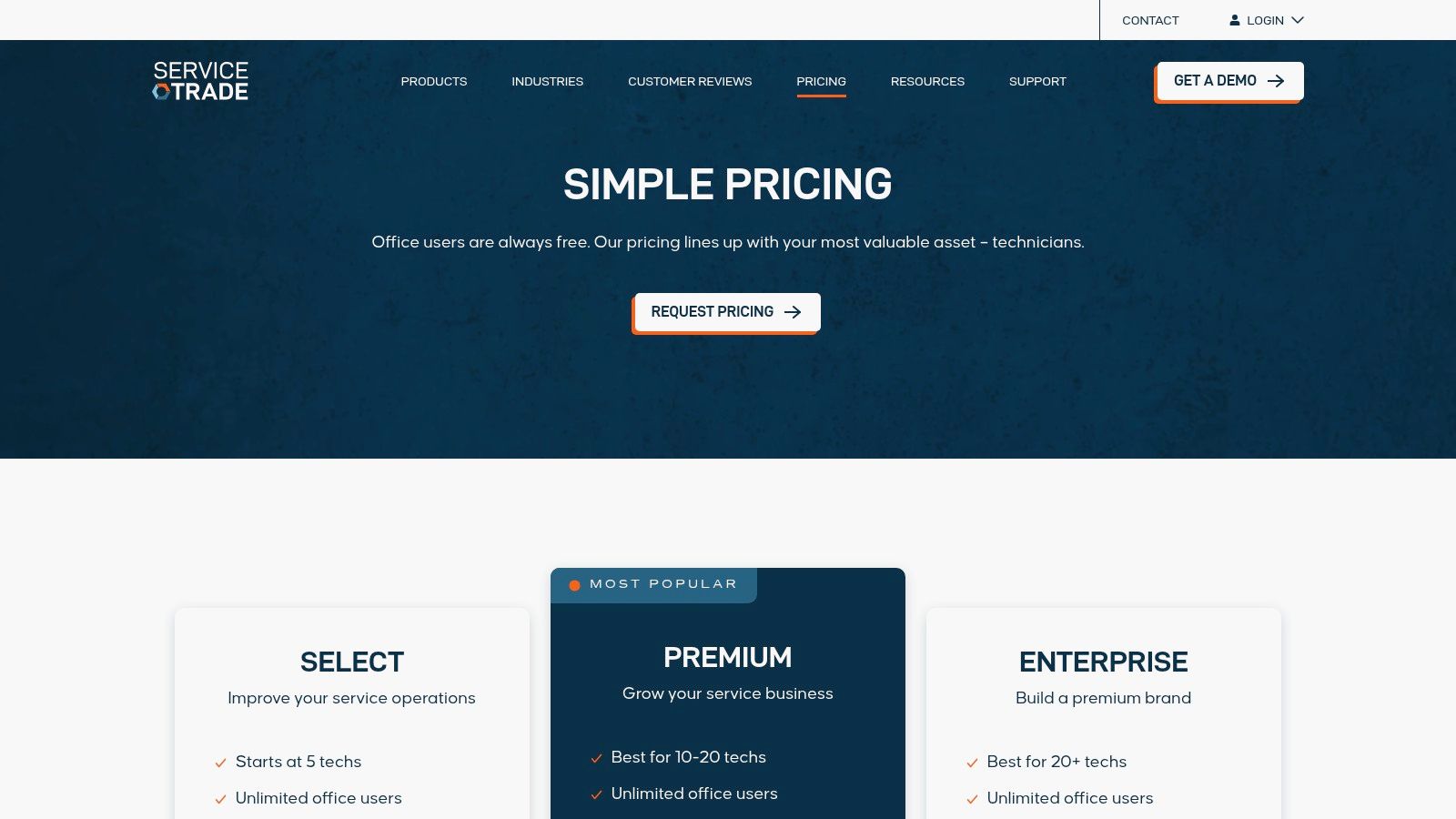
Its key differentiator is its pricing model, which charges per technician and offers unlimited seats for office staff. This encourages collaboration between the field and the office without incurring extra costs for dispatchers, accountants, or managers. The QuickBooks integration handles the flow of invoices, customers, and parts, but the platform's real strength lies in its asset management and customer service portal. However, its pricing is not public and requires a direct quote, and its specialized commercial features may be overly complex for simpler residential service businesses.
Best For: Commercial contractors (HVAC, fire protection, refrigeration) who need detailed asset tracking and want to provide a high-touch service portal for their clients.
Key Features:
- QuickBooks Integration: Syncs customers, invoices, and parts lists between ServiceTrade and QuickBooks.
- Customer Service Portal: Allows clients to view service history, approve quotes, and request work online.
- Asset Maintenance: Tracks equipment history, manages recurring maintenance schedules, and documents deficiencies.
- Project Management: Higher-tier plans include tools for managing larger, multi-visit projects.
Website: https://servicetrade.com/pricing/
Field Service Management Software Comparison for QuickBooks
Making the Right Connection for Your Business
Choosing the right field service management software for QuickBooks is a pivotal decision that extends far beyond a simple feature-to-feature comparison. It's about finding a true operational partner that seamlessly bridges the gap between your field activities and your financial backbone. As we've explored, the landscape is diverse, with each platform catering to specific business sizes, trades, and growth trajectories. The ideal solution isn't necessarily the one with the longest feature list; it's the one that most effectively automates your unique workflow and eliminates your most persistent administrative bottlenecks.
Your final choice hinges on a clear understanding of your business’s core needs. Are you a small, agile team of electricians or plumbers that thrives on a mobile-first approach? Platforms like Jobber and Housecall Pro offer intuitive, user-friendly interfaces and straightforward syncing with QuickBooks Online, perfect for getting started quickly. Conversely, are you a larger, more established enterprise in a specialized trade like HVAC or fire suppression, requiring intricate job costing, multi-level inventory management, and deep, two-way integration with QuickBooks Desktop? In that case, robust systems like ServiceTitan, FieldEdge, or Smart Service are engineered to handle that complexity, though they come with a steeper learning curve and a higher investment.
From Evaluation to Implementation: Your Action Plan
To move from analysis to action, you need a strategic approach. Don't get distracted by flashy marketing claims. Instead, focus on a hands-on evaluation process tailored to your real-world operations.
Here are your actionable next steps:
- Map Your Workflow: Before you even look at another demo, chart out your entire process from the initial customer call to the final payment reconciliation in QuickBooks. Pinpoint exactly where the delays, double-entry errors, and communication breakdowns occur. This map is your blueprint for evaluation.
- Prioritize Your Pain Points: Is your biggest challenge technician dispatching and route optimization? Or is it the lag time between job completion and invoicing? Your top three pain points should be the primary criteria for judging each field service management software for QuickBooks.
- Engage with Free Trials: Shortlist two or three top contenders from this list and commit to their free trials. Don’t just click around; run a real job through the system. Create a work order, dispatch a technician (even if it's yourself), complete the job on the mobile app, generate an invoice, and, most importantly, test the sync with your QuickBooks account (ideally a sandbox or test company file).
- Scrutinize the Integration: Pay close attention to the specifics of the QuickBooks integration. Does it support the version you use (Online or Desktop)? How does it handle syncing customers, items, invoices, and payments? Understand what syncs automatically versus what requires a manual push. A weak or clunky integration will defeat the entire purpose of the software.
- Assess Support and Onboarding: During your trial, contact customer support with a specific question. Their response time and the quality of their answer are strong indicators of the support you’ll receive after you’ve signed a contract. A powerful tool is useless without the support to help you leverage it effectively.
Ultimately, selecting the best field service management software for QuickBooks is an investment in your company's future efficiency and scalability. By grounding your decision in your specific operational needs and conducting a thorough, hands-on evaluation, you'll choose a solution that not only eliminates administrative headaches but also empowers your team to deliver exceptional service and drives sustainable growth.
While traditional FSM software manages your internal team, what about when you need to dispatch an external contractor? Nora is an AI-powered dispatch platform that helps you find and manage qualified third-party service providers, ensuring seamless job completion and invoicing. Complement your new FSM by using Nora to expand your service network and manage overflow work without the overhead.











